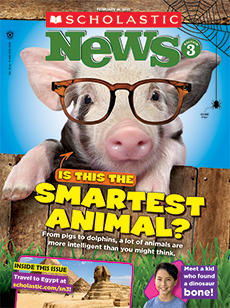1. How do the photos on page 3 support the article?
One photo shows a girl with a plastic shopping bag. The other shows a marine animal about to eat a plastic bag. Together, the photos show how our use of plastic can affect wildlife.
(RI.3.7 Using Visuals)
2. Summarize the section “Fixing the Problem.”
The section explains that people are working to get more plastic recycled. Scientists are developing plastic that doesn’t degrade when recycled, and cities and states have passed laws to cut down on single-use plastics. People can help by properly recycling, and companies can help by producing less plastic.
(RI.3.2 Main Idea and Key Details)
3. According to the sidebar “How You Can Help,” how can people “shop smarter”?
The sidebar explains that people can shop smarter by using reusable bags and choosing items that are not packed in plastic.
(RI.3.1 Text Evidence)
